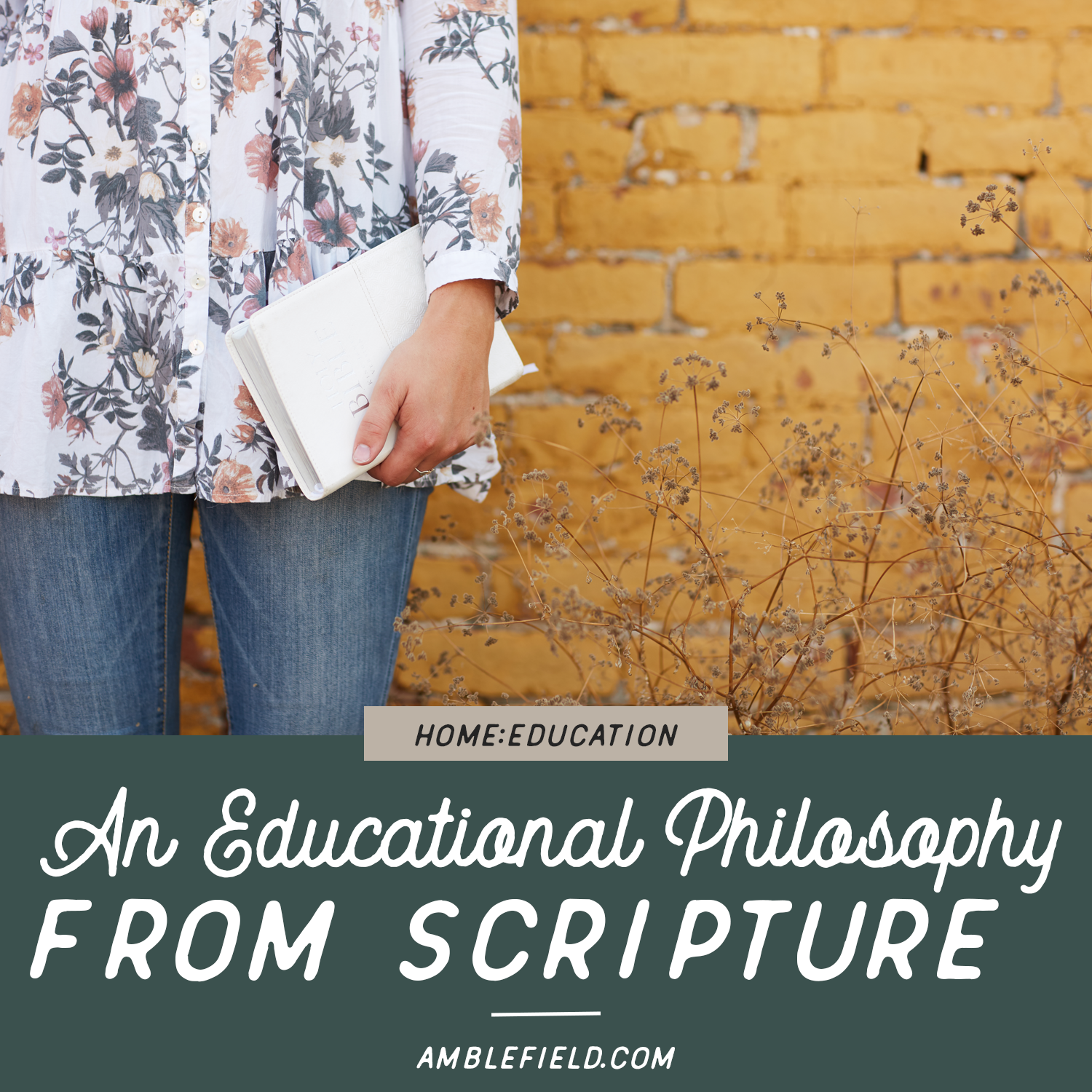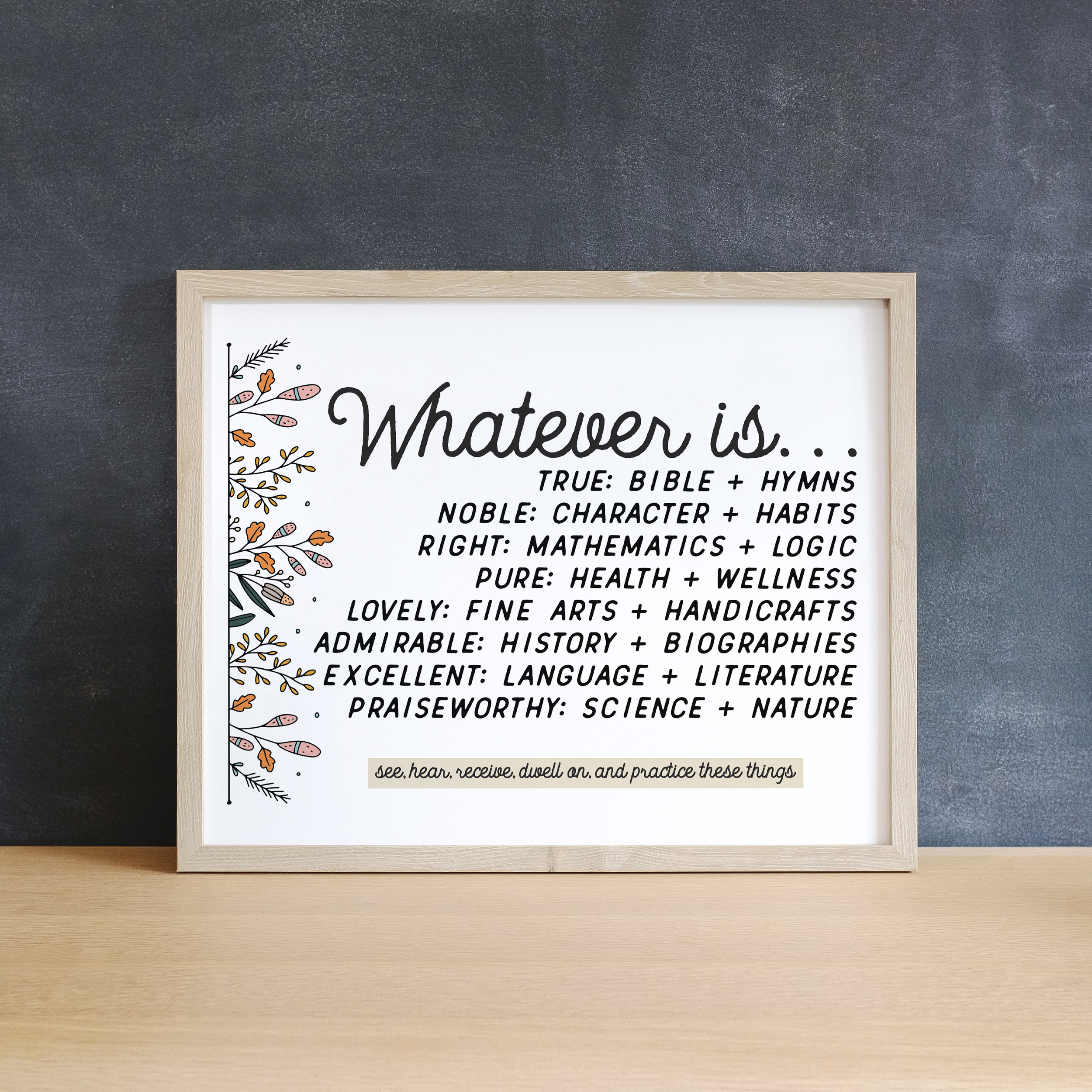an educational philosophy from scripture (free resource)
I remember the day a dear friend admitted to me that though she has been homeschooling for years, she's never cracked a "homeschooling book" — those ones that are filled with educational philosophies and methods, and how-to suggestions. She said this in hushed tones as though the home education police would surely hear and drag her away for committing such a crime.
And I was reminded of a piece of wisdom my husband shared with me earlier in the year regarding Bible study. I had been worried about my lack of competency for my time in the Word, and I was envious of my husband's background with biblical languages and his ability to translate Scripture for himself. I had acquired all kinds of apps and studies and highlighters and methods but still found myself lacking.
It was at this point that my kind and gracious man gently told me that I was already equipped with everything I needed to understand and apply Scripture. He said I didn't need the special apps or the knowledge of interlinear language studies or the Hebrew and Greek classes...all I needed was the Scriptures themselves and the work of the Holy Spirit in my heart.
As I sat across the table from my friend, I wondered — could it be the same with homeschooling? Surely, if God has called us to this lifestyle, this way of training up our children in the way they should go, won't He also equip us for it? Without the bells and whistles, without the comparison of one philosophy against another, without the perfect schoolroom or most organized planner, and without all those books my friend felt might hold some secret to home education that she'd missed. I found my answer to these wonderings tucked in the middle of Paul's letter to the church in Philippi and I caught my breath as these familiar verses jumped off the page with new application!
“Finally, brethren, whatever is true, whatever is noble, whatever is right, whatever is pure, whatever is lovely, whatever is admirable, whatever is excellent, whatever is praiseworthy — dwell on these things, the things you have learned and received and heard and seen in me, practice these things, and the God of peace will be with you.”
From these two verses, a simple rubric developed to guide our family’s intentions for home education. Right from the pages of Scripture, we see a philosophy for education emerge that is full of wisdom and grace — for kids and parents.
whatever is true: bible + hymns
This will forever be our starting point — the foundation we return to each day as we point our children and our own hearts to the Truth only found in Jesus Christ. We look for that Truth in the words of Scripture as we read God's story and tuck pieces into our hearts. And we find it in hymns that speak to every human emotion while pointing our hearts back to the Gospel in worship.
whatever is noble: character + habits
Academic learning is important, but we can never downplay the equal weight that character development should hold in our journey towards maturity. This is why we intentionally dedicate time to habit training — to see the Fruit of the Spirit being cultivated in our own hearts as well as in the lives of our children.
whatever is right: mathematics + logic
The beauty of arithmetic is that it's very black and white. There are right and wrong answers and formulas for solving problems. We want to be comfortable with this language that gives us practical tools for daily tasks. And beyond that, studying higher math and logic points us to the complexity and order that God used when He designed creation.
whatever is pure: health + wellness
As a matter of stewardship, we want to treat our bodies and minds with respect and care. So, we learn and experiment to find the best ways to keep our home clean, our bodies healthy, and our minds sharp. We learn as a family about natural remedies, growing healthy food for fueling our bodies, and practicing good hygiene habits. We give space for exercise and athletics and spend time in the outdoors for fresh air and plenty of sunshine. And we play all kinds of games for mental stimulation work and to build a joyful family culture!
whatever is lovely: fine art + handicrafts
Humanity has a unique ability to appreciate and create beauty. As Image-Bearers of the Creator, we make space for all art forms within our home. As we study various art mediums and artists alongside composers and music styles, we gain a greater appreciation for the creativity displayed in our world. And as we learn and practice new skills in the areas of art, music, and handicrafts we find fresh ways of worshipping our Creator while contributing to the feast of beauty.
whatever is admirable: history + biographies
Looking back at the lives of men and women who explored new worlds and shaped cultures gives us a chance to search for what is admirable in history. The good deeds, the courageous acts, the tough decisions, the growth of industries, and the births of new eras all point back to the greater story that God is weaving throughout the timeline of the world. Having a solid footing in where humanity has been gives us insight and wisdom for what lies ahead and how we are to carry out the message of the Gospel each day.
whatever is excellent: language + literature
Our main forms of communication come through spoken language and the written word. By working to ensure that our skills in these areas are excellent — if we can express ourselves well in speech and on the page — we have a greater chance of success in whatever work we do. Similarly, learning to recognize and appreciate excellent literature and poetry exposes us to fresh ways of expressing our perspectives, experiences, and emotions. And in a related manner, learning foreign languages expands our view of the world and allows us to connect with cultures different from our own.
whatever is praiseworthy: science + nature
By studying the way our world works (from physics to chemistry), examining how our bodies and minds are formed (from anatomy to psychology), and experiencing the interconnectedness of nature (from seasonal changes to ecosystems), we can't help but praise the Creator. Science, nature, and technology all point to the creativity, beauty, complexity, and masterful design that God has given us in our world.
the how
The question remains, how do we begin incorporating these things into the education of our children? The last half of the passage in Philippians moves beyond the content of the curriculum and into the methods of instruction. On a cognitive level, this passage says we are to dwell on them, spend time learning and receiving information about all of these things. And we are to approach this learning from all angles — visually (see), auditorily (hear), and kinesthetically (practice). And as parents, we should model this kind of learning for our children alongside them.
While a home education model may not be what Paul intended in his letter to the Philippians, these verses speak to my heart in a fresh way each year. For those moments of indecision or worry, when I'm concerned if I'm covering the right things or if my boys are on track with their peers, I refer to this list as a checkpoint and hold tight to that last part of the verse...









Welcome, friend — I’m Alle, a second-generation homeschooler with four boys living in the same mid-century ranch I grew up in.
In another season, my creative work took shape in the form of Kingdom-impacting projects for ministries and authors who were launching big things into the world — books and brands, courses and communities.
These days, I’m using those same skills and passions to create resources and tools for Homemakers and Home Educators who are building Kingdom-impacting families. You can sign up for free access to those simple projects in the Resource Library. I hope you will find some encouragement and support for your journey in this space.